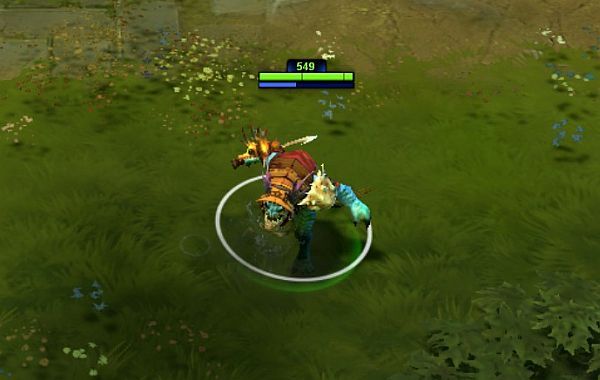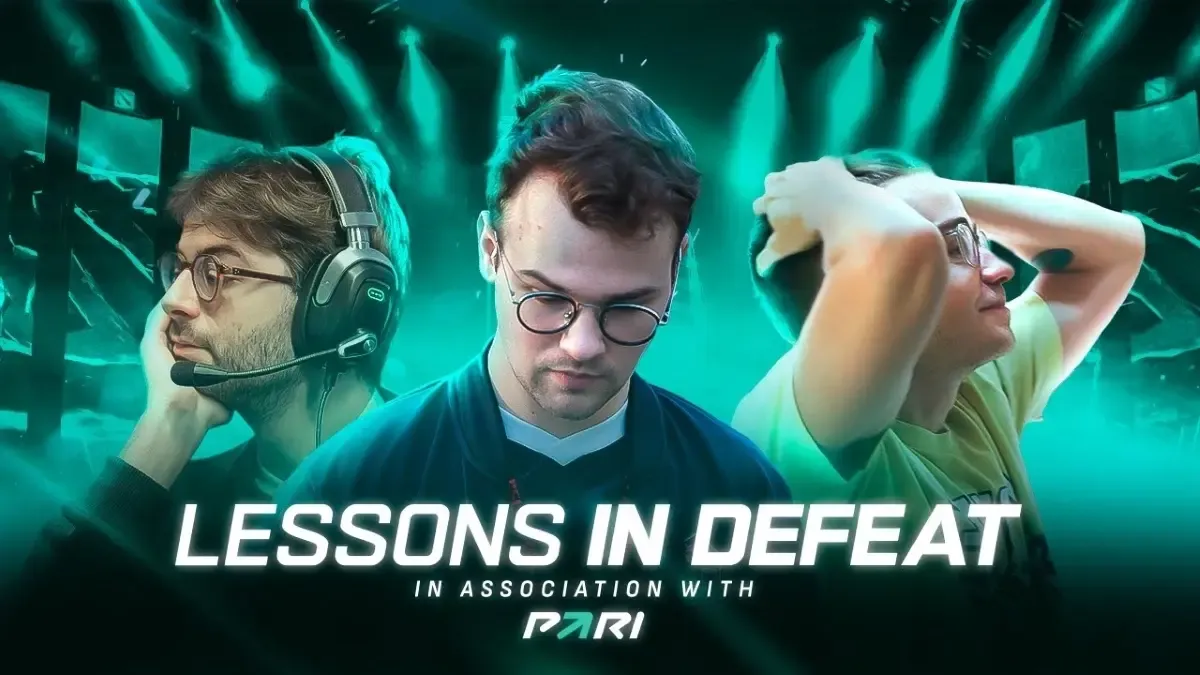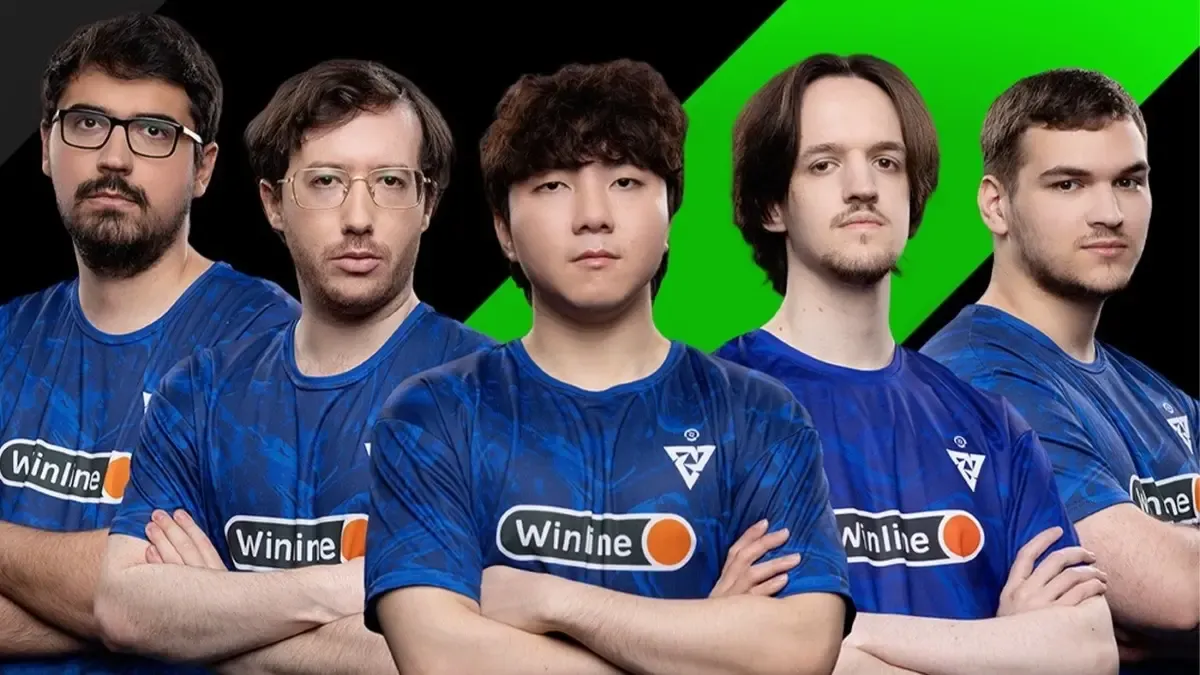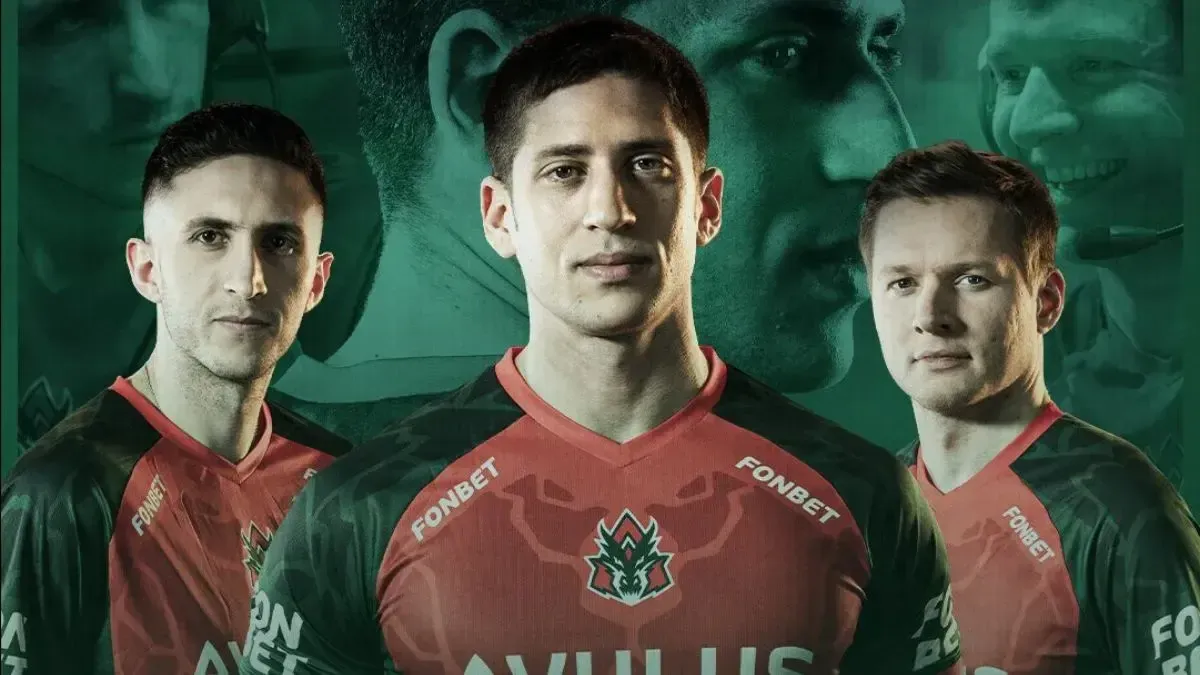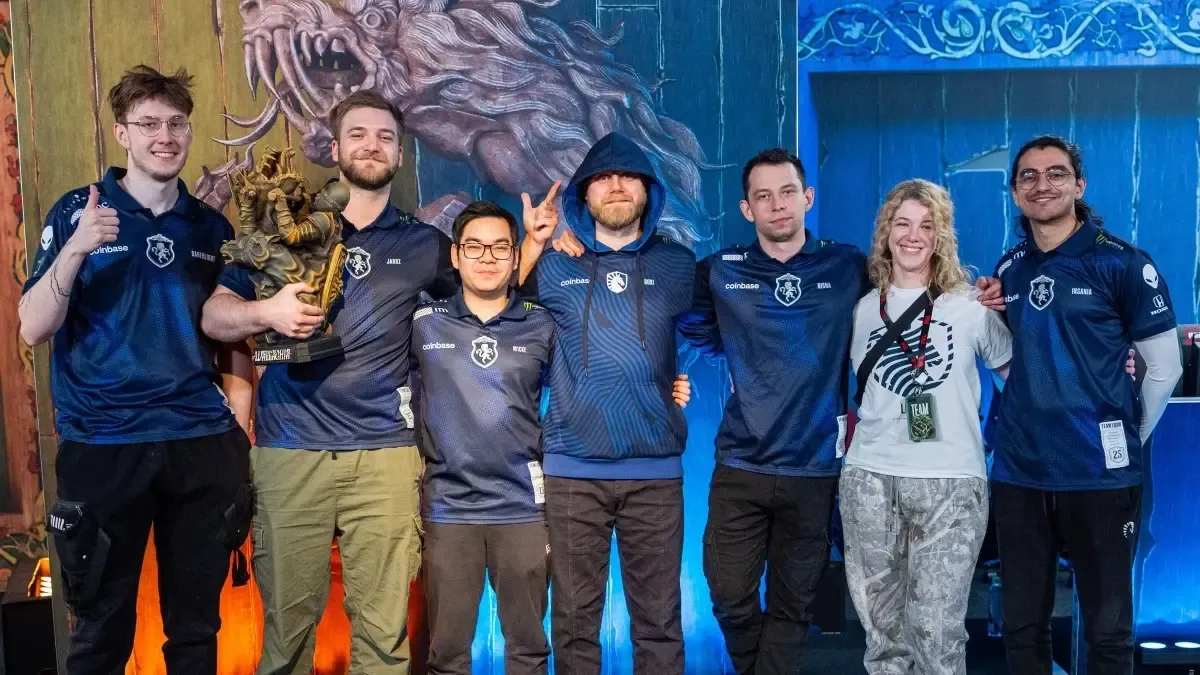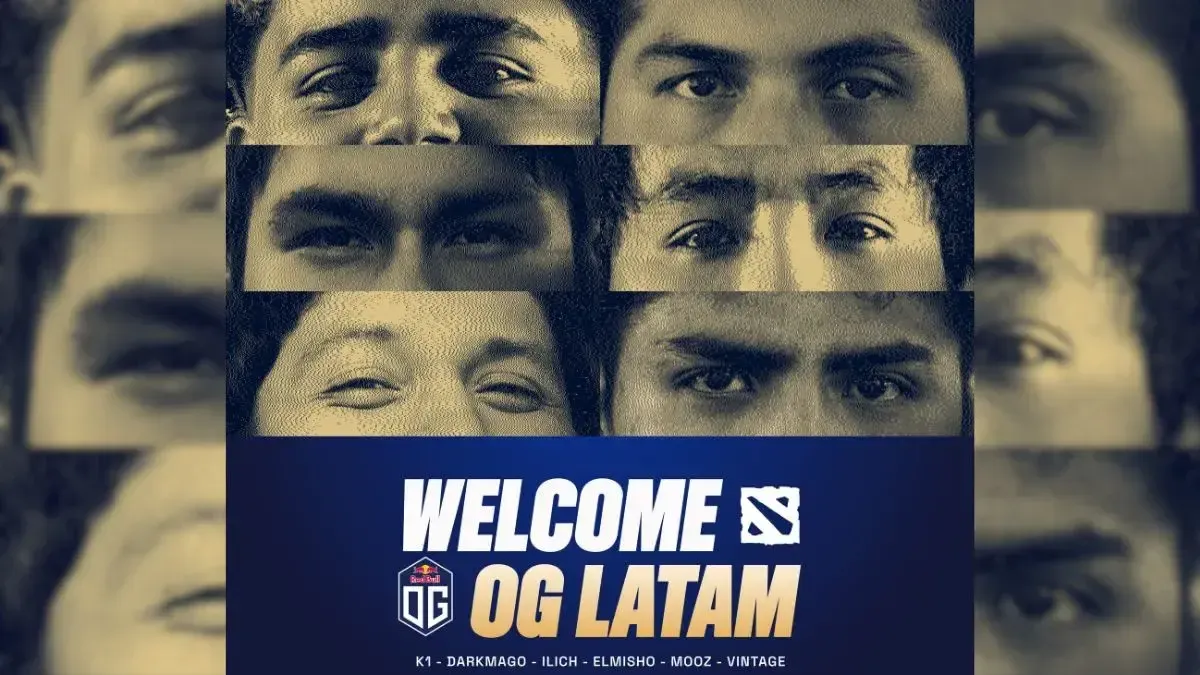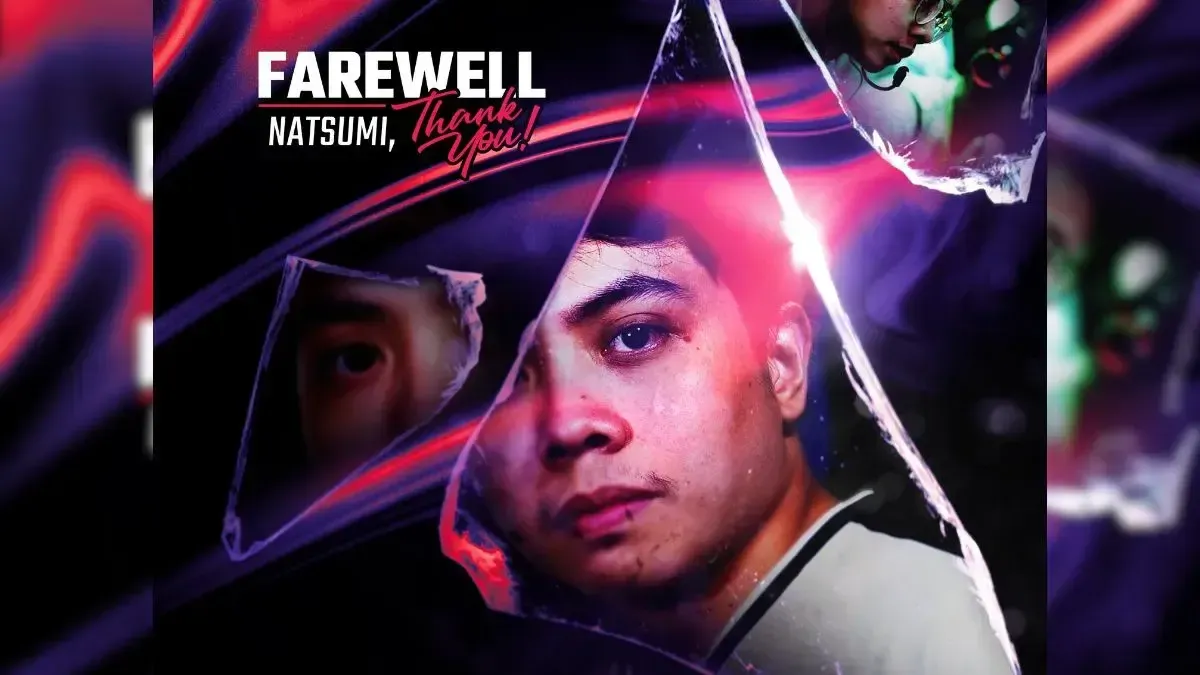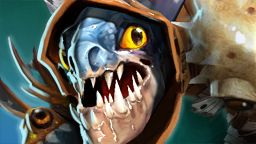
The Hero
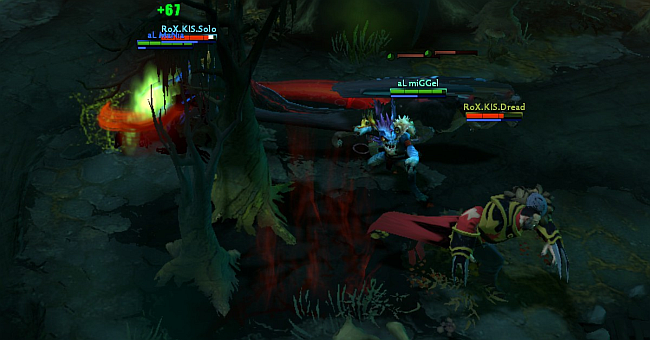
Slark is a melee Agility hero with reasonable base damage (58 ± 4) and powerful skills, but average starting stats and poor stat gain. Despite having a fairly high Strength base (21) for an Agility hero he has poor starting Intelligence (16). Fortunately for him, his spells are fairly low-cost. His stat gain is pretty terrible, with nothing above 2 points per level and an abysmal Agility gain of 1.5. To compensate, he has four incredibly strong abilities, which form the basis of his playstyle.
Slark has two missile disjoints, a pseudo-blink spell, a spammable self-purge and invisibility. All of this means that he's incredibly hard to kill. On top of that, two of his spells are high-damage nukes with minimal cost and cooldown. Add his insane speed when out of vision and ability to steal stats by auto-attacking, and you have a setup for the ultimate snowballing hero, with the capacity to become an omnipresent ganking power throughout the early and mid game.
He's the 13th most commonly played hero in public games, with a positive win rate, but can he survive the harsh competitive scene?
The Skillset
Dark Pact

If Pounce is Slark's bread and butter skill, Dark Pact is the plate it gets served on. On it's highest level, 300 damage is dealt to an area of 325 after a delay of 1.5 seconds. For the second from 1.5 to 2.5, multiple damage instances burst out of Slark, each one purging him of debuffs. Slark himself takes 150 damage for this. At 40 mana on a 6 second cooldown, this spell defines "spammable".
Dark Pact allows Slark to keep his momentum going in fights. With clever prediction, he can negate incoming stuns and missiles as soon as they hit, allowing him to run around and kill with impunity. Longer slows and potent damage over time spells are rendered useless, while otherwise-devastating debuffs like Drunken Haze and Sticky Napalm are shrugged off in seconds. This skill also makes Slark almost impervious to the effects of Dust, Track and Amplify Damage, forcing opposing supports into buying Sentry Wards or a Gem of True Sight. With applications in killing, conserving momentum and escaping, Dark Pact is a great skill.
Pounce
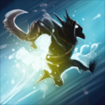
Pounce is Slark's essential skill. Like Dark Pact, it is both an offensive and a defensive skill. The ability to leap forward 700 units in the blink of an eye lets him initiate on foes with devastating effect, or flee into the shadows to make the most of your ultimate's passive. That's not even the best part: upon landing, your opponent takes damage and is leashed to the spot for 3.5 seconds. 3.5 seconds to steal stats and nuke your opponents while they sit there helplessly. It's beautiful, and a good Pounce can net first blood easily if your opponents aren't keeping an eye out.
Essence Shift
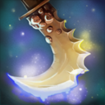
Oh? What's this? Another combined offensive/defensive skill? Say it isn't true! Essence Shift is a pretty simple skill, in effect. You hit things, you steal attributes. For every whack, your opponent loses a point of damage, 19 HP, 13 mana and 0.14 points of armour, and you get 3 points of agility. That's a point of armor for every few hits. Early game, one level of this skill is all you need to destroy your opponents in-lane. Low-mana opponents can't cast while low HP opponents get shredded.
Late game, Essence Shift lets you spiral out of control. All you need is one pick-off and the 2-minute stat bonus lets you charge around like it's a Spanish bull run. As an added bonus, it cuts through Magic Immunity. What more do you want?
Shadow Dance
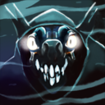
We finally get to Slark's ultimate, Shadow Dance, the icing on the tasty ganking cake. Offensive and defensive, all in one. Why are we even surprised? Slark gets insane regeneration when not in view of opponents, as well as a hefty bonus to his movement speed. And that's just the passive. When activated, he becomes permanently invisible. Attacking? Invisible. Casting spells? Invisible. Items? Still invisible. This lets Slark go bananas in the middle of a teamfight without fear of response or retribution.
The movement speed is arguably the most important part of this skill. Not only can Slark detect wards when he sees himself slow down, but it lets him be everywhere and anywhere: a perpetual ganking presence for the ultimate snowball hero.
The Items
Early Game


Everyone needs boots. These charming little pieces of foot-armor not only give bonus speed, but useful stats too. The question is - what does Slark need? Both Phase Boots and Treads have been used; the first gives him even more speed and bonus damage, while the second lets him attack faster and tank more hits. The ultimate decision comes down to whether Slark is against enemies who deal damage or can evade him. Phase lets him chase more effectively and make the most of every hit, while Treads can cover some early health and mana problems with smart stat switching. Conclusion? Go with what you're most comfortable with, since that's what the pros seem to do.

Drums of Endurance are also seen regularly on Slark. More health, more mana, more agility. Speed bonuses for everyone. The active lets Slark close in on opponents while keeping his ultimate saved, or to scurry away while his spells cool down.

The Orb of Venom is an item which has received a lot of cost buffs since its addition to Dota. At a neat 275 gold, the item lets Slark slow enemies by 12% (approximately 35 MS to most heroes) through his attacks. This slow lets him keep up with enemies, enabling him to attack-cancel an enemy for long distances. Slowed enemies can't get out of the area of Dark Pact or out of the way of Pounce. For 275 gold, this item gives a phenomenal early-game slow which Slark can make the most of.

Slark may require the Magic Bottle for his mana needs. He's also a fantastic hero to get runes such as Double Damage or Haste with. He can even use it for a quick bursts of regeneration when in Shadow Walk. While not all pro players get it, it is popular enough to deserve a mention, although tread switching combined with a few supports with Arcane Boots can remove the need for this item.
Mid Game

Diffusal Blade is even more of an offensive item on Slark than it is on other heroes. Apart from silences, Slark will never need to use the charges to debuff himself, thus keeping that sweet, sweet purging power for chasing enemies. Purge can devastate enemy carries and supports alike, removing buffs such as Empower, Ghost Form and rune bonuses. The burn passive also goes well with the stat steal, destroying opponents' mana pools. Lastly, the Agility and Intelligence provided by the blade bodes well with him - increasing his damage output and mana pool decently.

One of Slark's weaknesses is heavy-hitting right-clickers who don't fool around with disables and prefer to shoot, bash or slice their opponents to death. In the late-game, these carries pose a threat to the Nightcrawler. Not only does Heaven's Halberd give him bonus health to survive nukes, but it also gives him evasion to deal with the auto-attackers. The active ability turns his Pounce into a semi-stun for heroes who lack offensive spells, forcing them to stand by helplessly even if Slark is exposed. While not an assured pickup, Slark can get Halberd as a niche item to boost his strength against certain lineups.

Dark Pact is a fantastic spell. Really, it's a phenomenal spell. But it's sometimes just not enough. Especially in professional scenes, Slark can be forced or baited into wasting his self-purge, after which a backup disable is ready and waiting. The answer to this is Black King Bar and those juicy seconds of magic immunity it bestows. This gives Slark the power to storm even disable-heavy lines, keeping Dark Pact to shrug off ultimate spells and letting him rip through support heroes. We've seen plenty of occasions when an aggressive Slark, under protection of immunity, has killed off one or even two support heroes before the battle really begins. While not always vital, Black King Bar can help Slark cover the vulnerability he may experience when exposed or baited.

Another niche item, Slark can get Orchid Malevolence to counter lineups relying on one or two wombo-combo spellcasters. The ability to instantly prevent spells such as Reverse Polarity, Ball Lightning and Prophet's Teleport serves as a great counter to heroes Slark might usually have trouble dealing with. The magic regeneration allows him to cast his spells with impunity, and the extra attack speed doesn't hurt either.
Late Game

It's late-game. You've done what you can and ganked the map silly. The enemy supports are starved and terrified. They haven't been moving out of their base in ages. But, by the laws of time, the carries have managed to get some items up. That Alchemist is starting to sting. Maybe the Gyrocopter is doing a little too much damage while his Black King Bar is up. The cure? Abyssal Blade. A whopping bonus 100 damage, a passive bash and the active anti-magic stun mean that Slark is back in the running and can once more go toe-to-toe with those nasty hard carries.

While more of a late-mid luxury, Monkey King Bar has been used by Slark so as to counter evasion and miss-chances from heroes like Brewmaster. It also gives him what he desperately needs: a form of interrupt to stop teleport escapes. A large chunk of damage with a little attack speed on the side makes MKB a great pickup on Slark.
A brief history of Slark in the pro scene
Korok: The pioneer of Dark Reef
Current score: 3/1
Korok was the first player to pick Slark up in a big competitive game, playing him against Fnatic and helping seal the victory. Thrice more the Nightcrawler appeared, winning against Evil Geniuses and Team Dignitas, but losing to Na'Vi. One should note, though, that the Slark still managed to play well against Na'Vi, doing much to delay and avert disaster until the opposing Ursa Warrior simply got too strong.
Fnatic vs. Team Liquid, Game 2
Evil Geniuses vs. Team Liquid, Game 2
Team Liquid vs. Team Dignitas, Game 3
miGGel: Can't touch this
Current score: 3/0
If Korok introduced Slark to the scene, miGGel pitched him headfirst into the spotlight. Being used to secure an upset best-of-three victory against Rox.Kis, miGGel used Slark's early ganking power to oppress their opponents, denying them farm, obliterating their supports and keeping them down while AL's primary carry got fat and dangerous. When Slark was later banned against AL, they lost their strategy and a large part of their mid-game power, falling apart and losing both their startling lead and their position in the Western Qualifiers.
AL vs. Rox.Kis (Games 2 and 3)
DD vs. AL (Game 2)
FATA-: If at first you don't succeed
Current score: 1/2
Slark was also picked up by mousesports, against Na'Vi and iCCup Team. With Na'Vi claiming the two victories so far against Slark (this one, and their game against Team Liquid), have they sussed this hero out correctly? Slark suffers from two big weaknesses: difficulty in taking towers, and a hard time playing against 5-man Dota. While Na'Vi beat Team Liquid by drawing the game past Slark's effective point, mousesports failed to get him off to a good start and he was thus unable to ball out of control in the mid-game. Teams worried about Slark should note this: as a hero, he suffers an early failure harder than most.
Dendi: The one that got away
Current score: 0/1
Even Na'Vi is picking this elusive character. In a game against Power Rangers, in the Techlabs Cup, Dendi took Slark mid, rushing a Shadow Blade and attempting either a Monkey King Bar or a Daedalus. Despite demonstrating a significant strength early against the Batrider, and doing well to stay alive despite the heavy, prolonged teamfights, the Shadow Blade rush was a bit of an interesting pickup; Orchid or Black King Bar would have probably been a far stronger item. With only burst damage and very little utility, and with a wide array of lockdown on PR's side, Dendi was unable to snowball into the mid game to the extent needed, and Power Rangers managed to hold on and eventually farm up and push, securing a victory.
Chuan: The hopeful streamer
In his livestream, Chuan was seen experimenting with Slark in the safe lane, levelling Essence Shift on the first level instead of Pounce. While he may have been experimenting, one could argue that a first-level Essence Shift gives him lots of trading power against a solo hero. When asked about the next big hero in Dota 2, Chuan responded very simply: "Slark."
1437: The investigator
In a Skype interview with the GD Studio, 1437 was asked for his opinions on Slark. His response was that Slark was an interesting hero that they had not tried, but would definitely look into. His strength was noted, and 1437 mentioned that Slark would do best in either the mid or safe lane. This fits in fairly neatly with what we've seen from Slark so far; maybe we'll be seeing him in LGD.int's lineup soon!
longDD: The skeptic
LongDD, returning to LGD as a coach, was also asked on his opinions about Slark. He didn't seem particularly worried, noting that LGD will only look to adapt to Slark if teams like IG start playing him. Against teams like Alliance and Liquid, he has decided to see how it goes and, if necessary, pick a counter on the fly and see how it goes.
The Conclusions
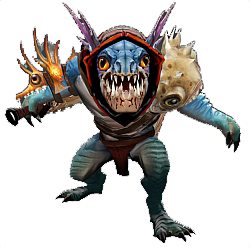 Is Slark here to stay, or is he just a pocket strat? Only time will tell. He has a fairly small pickup selection at the moment, but a great win-rate of 86% considering how new he is to the scene. Out of five TI3 qualifier games, he has won four, being a highly instrumental hero in all five games. Furthermore, he has a high teamfight participation score, being involved in more than 70% of the kills in some games, which assists a steady average gold-per-minute score of 475. Interesting to note is that his GPM and participation is not notably different, showing an important fact about Slark: even if he does well, which usually seems to be the case, he needs his team to take the reins and help him end. Being a poor tower-destroyer, Slark needs backup to push and end. This is also demonstrated in his game times, with an average victorious game time of 33:51 and an average loss game time of 52:33. It's pretty clear: Slark can dominate mid-game, but will fall off sharply as the enemy carries finally get farmed.
Is Slark here to stay, or is he just a pocket strat? Only time will tell. He has a fairly small pickup selection at the moment, but a great win-rate of 86% considering how new he is to the scene. Out of five TI3 qualifier games, he has won four, being a highly instrumental hero in all five games. Furthermore, he has a high teamfight participation score, being involved in more than 70% of the kills in some games, which assists a steady average gold-per-minute score of 475. Interesting to note is that his GPM and participation is not notably different, showing an important fact about Slark: even if he does well, which usually seems to be the case, he needs his team to take the reins and help him end. Being a poor tower-destroyer, Slark needs backup to push and end. This is also demonstrated in his game times, with an average victorious game time of 33:51 and an average loss game time of 52:33. It's pretty clear: Slark can dominate mid-game, but will fall off sharply as the enemy carries finally get farmed.
In looking at Slark, the most important thing to understand is how to beat him. As discussed eloquently by Shred_Kid here, Slark seems to have three major weaknesses: a difficulty in taking towers (where he cannot rely on his invisibility and regeneration), trouble in the early game (as a result of losing his lane after being placed against certain A-tier mid heroes such as Puck) or early 5-man play from the opposing team (restricting his ability to pick off kills and snowball). This forces him to play with heroes that have pushing potential, such as Lone Druid; while this is not a bad thing, Lone Druid is both a common ban and a popular pick.
What we can note from Slark is that he devastates certain heroes. Nyx and Templar Assassin cannot reliably prevent his damage with their negation spells due to Dark Pact, and Batrider cannot securely mount up Napalm stacks or get a lasso off thanks to the same self-purge. His ability to locate and counter wards is also often overlooked. In effect, I truly think that Slark has a skillset that is powerful enough to deal with his poor stat set, and one that fits well into the current ganking scene. While some heroes may counter him, the mid-lane heroes are often picked early on and as such Slark will usually remain to respond to heroes like the popular Batrider.
The pro players have clearly taken a look at this hero, and some of them have yielded stunning results. We can only hope that this dynamic hero gets some more spotlight, since he brings the promise of slick skills and crazy escapes.

